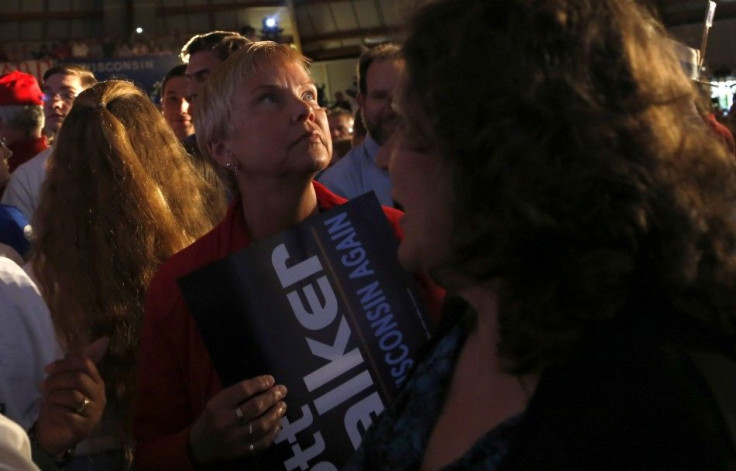Wisconsin Gov. Scott Walker Survives Recall

Scott Walker, the divisive Republican governor of Wisconsin, survived a recall vote Tuesday.
The television networks projected the result an hour after polls closed. By 11 p.m. Central time, with 87 percent of precincts reporting, Walker had 1,119,242 votes, or 54.3 percent, against Milwaukee Mayor Tom Barrett's 931,624, or 45.2 percent, Talkingpointsmemo.com reported.
Barrett conceded around 10 p.m.
I just got off the phone with Gov. Walker and congratulated him on his victory tonight, Barrett told supporters at his concession speech in Milwaukee, TPM reported. We agreed that it is important for us towork together.
And I want to thank all of you for the work that you have done. This has been the most amazing experience of our lives. And what we have seen over the last 16 months is we have seen this democracy come alive.
Walker sounded some conciliatory notes in his victory speech in Waukesha.
Now it is time to move on and move forward in Wisconsin, Walker said. Tomorrow I'll meet with my cabinet in the state's capitol, and we'll renew our commitment to help small business grow jobs in this state. We'll renew our commitment to help grow the quality of life for all of our citizens -- both those who voted for me and those who voted for someone else. Because tomorrow is the day after the election, and tomorrow we are no longer opponents. We are one as Wisconsinites, so together we can move Wisconsin forward.
The tea party favorite survived an effort by the state's labor movement to oust him, springing from widespread anger over Walker's ultimately successful effort to strip public sector unions of most of their collective bargaining rights. The controversy launched a series of gargantuan protests of the state capitol and led Walker's opponents to force a recall vote less than two years into his four-year term. Democrats collected almost 1 million signatures in the petition drive to oust him.
Wisconsin has given their stamp of approval to Gov. Walker's successful reforms that balanced the budget, put people back to work and put government back on the side of the people, Republican National Committee Chairman Reince Priebus said Tuesday night.
Republican presidential nominee Mitt Romney, who has thus far stayed relatively silent about the Wisconsin recall, echoed Priebus' praise.
Gov. Walker has demonstrated over the past year what sound fiscal policies can do to turn an economy around, and I believe that in November voters across the country will demonstrate that they want the same in Washington, D.C. Tonight's results will echo beyond the borders of Wisconsin.
Pollsters predicted the recall would be razor-thin in the days leading to the election, when Walker was just barely leading Barrett in a series of polls.
Early exit polls showed Wisconsin residents almost evenly divided on their view of Walker's plan to restrict collective bargaining rights for public sector union workers. On Tuesday, 52 percent said they had a favorable view of unions for government workers, according to CBS News, while 43 percent had an unfavorable view. Among voters in union households, 69 percent viewed labors favorably.
Meanwhile, 50 percent said they approved of Walker's collective bargaining adjustments, compared to 48 percent who did not approve.
Interestingly, a majority of respondents -- 60 percent -- said they believed recall elections are only appropriate for official misconduct, a figure that likely includes many Democratic respondents and Walker opponents.
Although plans to recall Walker started shortly after he introduced his collective bargaining plan as part of a so-called Budget Repair Bill, his opponents were not able to start the recall process until he had been in office for a year. The controversial plan prompted tens of thousands of protesters to occupy the capitol and led Senate Democrats to leave the state for three weeks in an effort to block the bill.
Now that Walker has survived the recall, he cannot face another one for the remainder of his term.
Also on the recall ballot were Lt. Gov. Rebecca Kleefish and four Republican state senators. Kleefish, the first lieutenant governor in U.S. history to face a recall vote, defeated her Democratic opponent. The Republican senators were all in the lead late Tuesday night.
The recall campaign was the most expensive in Wisconsin's history. Walker raised more than $30 million since January 2011, with just over half of it coming from out-of-state donors, according to multiple reports. That was more than seven times the $3.9 million Barrett raised since joining the race on March 30.
The election marked the second round of recalls in Wisconsin in less than a year. Last summer, nine state senators -- six Republicans and three Democrats -- faced recall elections, leading Democrats to gain two seats, just shy of a majority.
© Copyright IBTimes 2024. All rights reserved.











